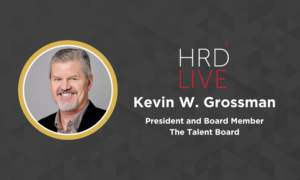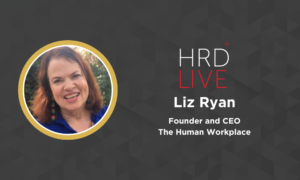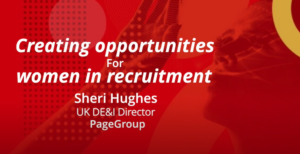Do Recruitment Agencies still have a role to play?
- 6 Min Read
With technology having such a huge effect on the world of work. Martin Blackburn, UK People Director at KPMG discusses whether recruitment agencies still have a role to play in talent acquisition.
- Author: Martin Blackburn
- Date published: Mar 14, 2019
- Categories

I get a lot of emails. You too? Gosh we should set up a support group.
 But my pet hate email? The email equivalent of waking up one morning and finding someone’s dumped an old sofa in the front garden? The unsolicited CV from a recruitment agency I’ve never heard of that isn’t on our Preferred Supplier List (PSL). I had an example just today – details of a candidate with skills and experience we aren’t seeking wanting to work in a city where we have no office. Unsubscribe from future emails. Will probably be ignored.
But my pet hate email? The email equivalent of waking up one morning and finding someone’s dumped an old sofa in the front garden? The unsolicited CV from a recruitment agency I’ve never heard of that isn’t on our Preferred Supplier List (PSL). I had an example just today – details of a candidate with skills and experience we aren’t seeking wanting to work in a city where we have no office. Unsubscribe from future emails. Will probably be ignored.
In the world of HR, the word ‘disrupt’ is in my view somewhat overused. But the recruitment market has clearly been disrupted as have most markets where intermediaries once played a part. Linkedin, job boards, a firm’s own careers site, the need for a third party has diminished if not in many cases vanished entirely. The vast majority of applicants to KPMG come to us direct. In fact the KPMG careers site – kpmgcareers – had in excess of a million hits last year.
So in our tech-savvy age when thinking about the workforce of the future – more active on social media, more focused on role vs job, more driven by their own personal brand and marketability – what role does the recruitment agency play?
Clearly, there are the big recruitment process outsourcers. KPMG uses three – Cielo for our more junior experienced hires, Lorien for technology and Resource Solutions for contractors. But what about the recruitment agent or search firm? I asked one of our preferred suppliers, Tim Connellan at Park Road and ex-Korn Ferry Partner for his view.
“The role has changed dramatically,” says Tim. “Historically what the client was paying for was data, access to a black book of contacts built up over numerous years. The digital age rendered the traditional head-hunter USP obsolete and as such we have all had to reinvent ourselves. What counts now is direct access to the most senior professionals in a particular sector who trust the head-hunter with referrals and suggestions. These relationships are built up over a number of years and are truly invaluable. The major search firms are well aware of this and are trying to reinvent themselves as ‘human capital consultancies’ with varying degrees of success. Going forward the head-hunter needs to be a trusted advisor to the companies they support. But this is a two-way street. Head-hunters need to be given access to the firm’s strategy and long-term goals in order to serve them as effectively as possible.”
Tim touches on something important here. A common refrain I hear from search firms is a concern the in-house recruitment team are keeping them from the business. But the team’s role is a careful balance – ensuring external recruiters fully understand the business and individuals for whom they’re recruiting but equally protecting our time-pressured fee earners from a deluge of needless conversations and CVs.
That’s why our very best search firms are, as Tim suggests, partners. Focused upon a long term relationship with us, not just the short term filling of a vacancy. They want to know where we’re taking our business, helping us to map the market and consider the skills we’re going to need in the future, not just now. They’re also proactive around our inclusion and diversity targets, supporting us to attract diverse talent into our business, knowing sometimes that’s a long game.
“We all know the easiest way to make money in recruitment is to find a square peg for a square hole,” says Tim “but if one is to take the title consultant seriously then you need to push your clients to consider, evaluate and hire different candidates. Without this we will never move the dial on improving diversity in hiring and this will negatively impact the bottom line.”
The search firms at the top of our PSL also know the relationship doesn’t end when the candidate starts and the invoice is raised. The search firm has a deep independent relationship with the candidate which can be crucial in successfully onboarding candidates in their first 100 days. True partnership is about the search firm having as much invested in the success of the candidates they place as KPMG.
So what further changes can we expect in the market?
For the one thing, the traditional hard assessment of data is coming to an end. There are any number of systems and packages using machine learning and AI to identify keywords and phrases contained within a CV as a simple way of assessing suitability for a role. Where the search firm is likely to add value is in identifying the cultural fit of a particular candidate to an organisation.
“It is a well-known fact that cultural fit is crucial to the successful implementation of a strategy,” says Tim. “This needs to be considered in conjunction with a clear understanding of unconscious bias. A trusted search firm will encourage the business to look outside the box, meet different candidates and be able to define why that person is able to add real value.” Last year KPMG made the decision to stop using recruiters who provided all-male lists, so the partnerships we have now are all clear that the diversity of candidates is high on our priority list.
One of the problems we, as well as many other large organisations, have is PSL creep – the pressure to add an agency onto the PSL, leading to a list with a long tail of firms that recruit maybe one or two people for us a year. This has been exacerbated by the proliferation of recruitment firms. Barriers to entry are limited. But the larger the PSL, the more difficult it is to ensure a consistent message in the market about KPMG’s employee value proposition. That’s why we’re increasingly focused upon active management of our PSL, ensuring the firms we partner with mirror our culture and values and role model exemplary candidate management. At the end of the day, candidates judge KPMG on the quality of their recruitment experience, regardless of whether that was through an intermediary.
So in answer to my question, yes, there is a role for the search firm or recruitment agency. And probably always will be. But it’s changing. A greater focus upon partnership, on longer term relationships, on a stake in the successful on-boarding of candidates, on supporting organisations to achieve their inclusion and diversity ambitions. Those are the firms that will always be on our PSL, not the agencies who lob a few CV’s at you and hope one might just stick.









